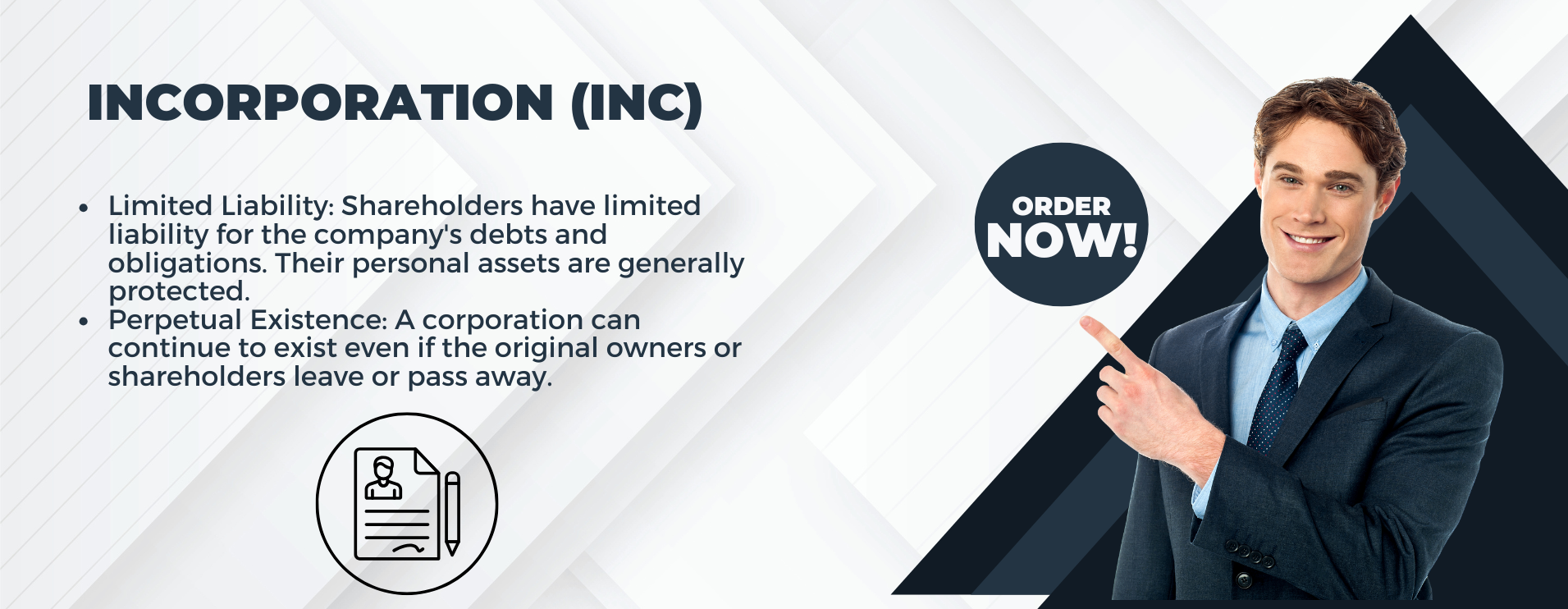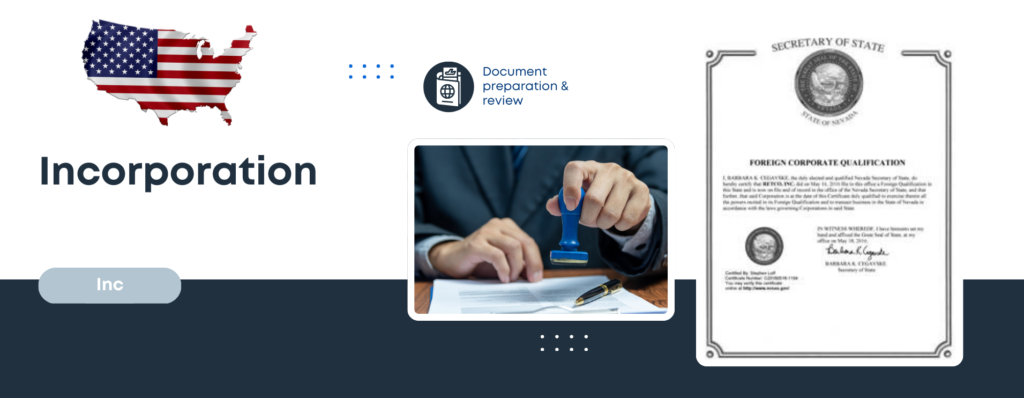
Incorporation Inc
refers to the process of legally forming a corporation, a type of business structure that is separate and distinct from its owners (shareholders). When a business incorporates, it becomes a legal entity with its own rights, responsibilities, and liabilities. Corporations are commonly used by medium to large businesses due to their ability to raise capital, provide liability protection, and offer perpetual existence.

Key Characteristics of a Corporation (Inc.):
- Separate Legal Entity:
- A corporation is treated as a separate legal entity from its owners, meaning it can enter contracts, sue or be sued, and own assets in its own name.
- Limited Liability:
- Shareholders are not personally liable for the corporation’s debts or legal obligations. Their liability is limited to the amount they have invested in the company.
- Ownership:
- Ownership is represented by shares of stock, which can be transferred or sold.
- Taxation:
- Corporations are subject to corporate income tax. Depending on the type of corporation, profits may be taxed at both the corporate and individual levels (double taxation).
- Management:
- Managed by a board of directors elected by shareholders. Day-to-day operations are handled by officers (e.g., CEO, CFO).
- Regulation:
- Corporations are subject to more regulations and reporting requirements than other business structures.
Types of Corporations:
- C-Corporation (C-Corp):
- The most common type of corporation.
- Subject to double taxation: The corporation pays taxes on its profits, and shareholders pay taxes on dividends.
- No restrictions on the number or type of shareholders.
- Can issue multiple classes of stock (e.g., common and preferred shares).
- S-Corporation (S-Corp):
- A special type of corporation that elects to pass corporate income, losses, deductions, and credits through to shareholders for federal tax purposes (avoiding double taxation).
- Limited to 100 shareholders, who must be U.S. citizens or residents.
- Only one class of stock is allowed.
Advantages of Incorporation (Inc.):
- Limited Liability:
- Protects shareholders’ personal assets from business debts and lawsuits.
- Ability to Raise Capital:
- Corporations can raise funds by issuing stock to investors.
- Perpetual Existence:
- The corporation continues to exist even if ownership changes (e.g., shareholders sell their shares or pass away).
- Credibility:
- Corporations are often perceived as more credible by customers, investors, and partners.
- Tax Benefits (S-Corp):
- S-Corporations avoid double taxation by passing income directly to shareholders.
Disadvantages of Incorporation (Inc.):
- Complexity:
- More difficult and expensive to form and maintain than other business structures (e.g., sole proprietorships, partnerships, LLCs).
- Double Taxation (C-Corp):
- Profits are taxed at both the corporate and individual levels (for dividends).
- Regulatory Burden:
- Subject to extensive regulations and reporting requirements (e.g., annual reports, shareholder meetings).
- Cost:
- Higher formation and maintenance costs, including filing fees, legal fees, and ongoing compliance costs.
Incorporation (Inc.) vs. Other Business Structures:
Feature | Corporation (Inc.) | LLC | Sole Proprietorship | Partnership |
Liability | Limited liability | Limited liability | Unlimited liability | Varies (unlimited/limited) |
Taxation | Double taxation (C-Corp) or pass-through (S-Corp) | Pass-through (default) | Pass-through | Pass-through |
Ownership | Shareholders | Members | Single owner | Two or more owners |
Management | Board of directors | Member- or manager-managed | Owner-managed | Partner-managed |
Formation Complexity | Complex | Moderate | Simple | Simple |
When to Choose Incorporation (Inc.):
- If you want to protect your personal assets from business liabilities.
- If you plan to raise significant capital or go public.
- If you want to establish a business with perpetual existence.
- If you are willing to handle the complexity and regulatory requirements.
Incorporation is ideal for medium to large businesses with growth ambitions, especially those seeking to attract investors or go public. The choice between a C-Corp and an S-Corp depends on factors like taxation, ownership structure, and long-term goals.
The Fastest, Easiest and Cheapest Way to Obtain your Licenses.... As easy as 1, 2 and 3!
Ready to Get Started?
Don’t wait any longer! Take the first step towards making your business dreams a reality. Our team is here to provide you with personalized, efficient, and reliable services. Whether you need help with licenses, permits, tax numbers, or business registrations, we’ve got you covered.
You’ve made the exciting decision to start a business! Now, determining the legal structure is crucial because it impacts taxation, liability, and decision-making authority. To help you understand which licenses your business might need, you can take this small quiz:

Work with Us
Why Choose Us
Faster Solutions
Orientation to Our Clients
99.99% Success Rate in Our Procedures
Designing your Brand
How We Help You!
"The Success of your Business is the Success for our Business"
Business Filing US
We handle and complete your licenses in a very personal way. Upon submitting your documents, you will receive them by regular mail or e-mail. Please note that some documents must be presented in person or require the original signature of the owner or representative.

Verification of Information Received from the Client
“To ensure accurate and timely processing of your licenses, permits, registrations, or tax numbers, we verify that all necessary information has been received. In all states, it is mandatory to provide personal information for at least one of the business owners…”

Presentation of Licenses, Permits, Tax Numbers, and Registrations
“Using your provided personal and business information, we meticulously prepare all the necessary documents for your requested licenses and tax numbers. We conduct thorough verification of all information to ensure swift and successful approval.”

Delivery of Registration Certificates
“Most licenses and tax numbers will be delivered to you via email. We will strive to obtain original certificates for each license where possible. You may receive some original certificates by mail. For specific licenses, such as business licenses, please carefully review the service description, as some states require the original signature of the client.”
Find out which licenses are right for you in your state.
Some Questions on our blog

What licenses do you need to start a Handyman business?
Starting a handyman business requires obtaining several licenses and permits, which can vary depending on your location and the specific services you plan to offer. that depends a lot on what kind of structure your business has. Most new businesses start with a basic structure, i.e., Sole Proprietorship or Partnership. Whatever your situation, you will need to register a business name, obtain an EIN, and secure a business license. If you have employees, you will also need an Employer Number (State Tax ID number or Withholding Number).

What licenses do I need to start my business?
To start your business, you’ll need to obtain several licenses and permits, which can vary depending on your location and the type of business you’re starting. The answer depends a lot on what kind of structure your business has. Most new businesses start with a basic structure, i.e., Sole Proprietorship or Partnership. Whatever your situation, you will need to register a business name, obtain an EIN, and secure a business license. If you have employees, you will also need an Employer Number (State Tax ID number or Withholding Number).

I want to sell clothes from home, what licenses do I need?
To sell clothes from home, you'll need to obtain several licenses and permits to ensure you're operating legally. The answer depends a lot on what kind of structure your business has. Most new businesses start with a basic structure, i.e., Sole Proprietorship or Partnership. Whatever your situation, you will need to register a business name, obtain an EIN, and secure a business license. If you have employees, you will also need an Employer Number (State Tax ID number or Withholding Number).

I'm starting a business in FL, I want to register my LLC in the state?
Great choice! Registering your LLC in Florida is a straightforward process. Most new businesses start with a basic structure, i.e., Sole Proprietorship or Partnership. Whatever your situation, you will need to register a business name, obtain an EIN, and secure a business license. If you have employees, you will also need an Employer Number (State Tax ID number or Withholding Number).
Here are a few example questions on our blog:
- What Are the Key Steps to Start a Business in CA?
- How to Choose the Right Business Structure for Your Needs?
- What Licenses and Permits Do You Need for a Home-Based Business?
- Understanding the Importance of an EIN and How to Get One
- Common Mistakes to Avoid When Registering Your LLC
- What Is a Registered Agent and Why Do You Need One?
- The Benefits of Incorporating Your Business
- Steps to Transition from a Sole Proprietorship to an LLC
Business Filing US
We are not affiliated with the government. Please be aware that we are a firm that assists you in fulfilling all the necessary requirements to start your business, for a fee for our services.
By submitting your electronic signature, you authorize BusinessFilingUS.com or licenciasdenegociosusa.com to complete and sign all your licenses on your behalf, unless an original signature is required.
Additionally, it will be necessary for you to provide all the information we need for this process, including your SSN, DOB, and driver’s license, depending on the state where your business is located.























































